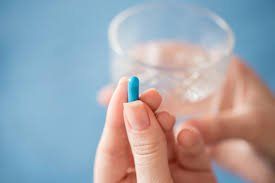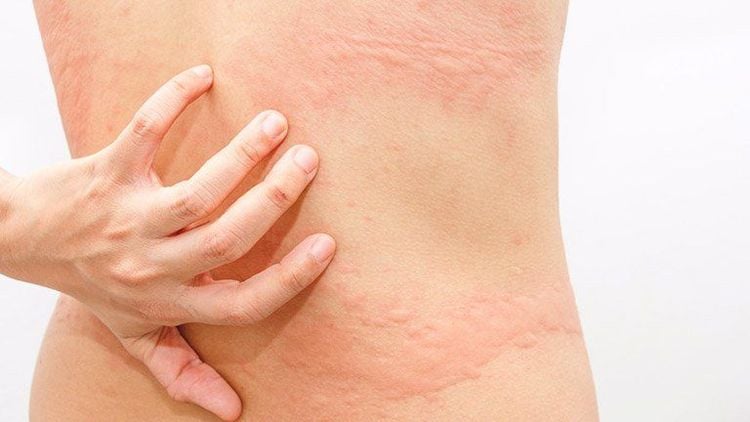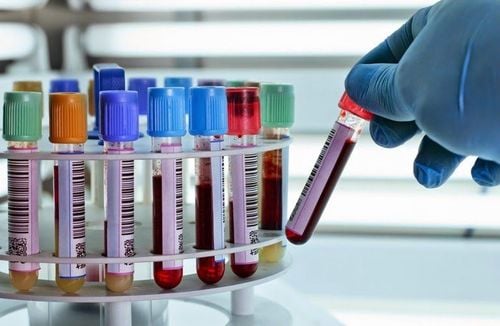This is an automatically translated article.
Precocious puberty is when a child's body changes to an adult's body beginning before age 8 in girls and before age 9 in boys. Puberty includes rapid bone and muscle growth, changes in body shape and size, and development of fertility. Treatments for precocious puberty often use precocious puberty inhibitors. So what side effects can the drug treatment cause for the child?
1. Causes of Precocious Puberty
Precocious puberty is the result of early activation of the hypothalamic-pituitary-gonadal axis causing physical and physiological changes including rapid bone and muscle growth, and changes in shape form - body size, and reproductive development.
Factors that contribute to early development include:
1.1. Pituitary gland
The pituitary gland regulates the release of most of the body's hormones. It is a pea-sized gland located below the brain. The pituitary gland controls the release of thyroid, adrenal, growth, and sex hormones. The hypothalamus, located in the brain above the pituitary gland, regulates the release of hormones from the pituitary gland.
1.2. Hormones
Hormones are messengers that carry information from cell to cell in the body. Hormones are carried throughout the body by the blood and are responsible for regulating many bodily functions. The body makes many hormones (for example, thyroid, growth hormone, sex, and adrenal glands) that work together to maintain normal body function. Hormones involved in controlling puberty include:
GnRH: A gonadotropin-releasing hormone, which comes from the hypothalamus and controls the release of luteinizing hormone (LH hormone) and follicle-stimulating hormone (LH) FSH) from the pituitary gland. LH: Luteinizing hormone, one of the pituitary hormones that combine with the hormone FSH to stimulate the production of male/female sex hormones in the testes/ovaries. FSH: Follicle Stimulating Hormone, a pituitary hormone that combines with LH hormone to stimulate sperm/egg development. Testosterone: A male sex hormone (androgen), produced by the testes in boys. It also occurs in smaller amounts in girls. Other androgens from the adrenal glands (located near the kidneys) produce pubic and armpit hair during puberty. Estrogen: A female sex hormone, responsible for breast development in girls. It is made mainly by the ovaries, but is also present in lesser amounts in boys. Sex Hormones: Responsible for the development of signs of puberty as well as changes in behavior and the ability to have children.

Dậy thì sớm là khi cơ thể của trẻ thay đổi thành cơ thể của người lớn bắt đầu trước 8 tuổi ở bé gái và trước 9 tuổi ở bé trai
The cause of early puberty in girls and boys is still unclear. In some cases, the pituitary gland signals the ovaries and testes to make female and male hormones earlier than usual. In other cases, signs of precocious puberty occur due to abnormalities in the ovaries, testes, pituitary gland, and adrenal glands. To confirm for sure if your child has precocious puberty, some tests such as x-rays of the bones, magnetic resonance imaging (MRI), test to stimulate the release of gonadotropin-releasing hormone (GnRH) and other blood tests...
2. Treatment of Precocious Puberty
If the child is diagnosed with precocious puberty, drug treatment is definitely needed. The goals of treatment with this drug are to inhibit precocious puberty and decrease the rate of bone maturation. The rapid bone maturation process will cause the child's adult height to be lower than the child's potential height. After the first few months of treatment, your child's rapid growth will slow down, and his stage of puberty will not change.
GnRH analogues are given every 3 or 4 weeks or as an implant just under the skin of the baby's inner arm every 12 months. The child will be given medication until it is appropriate to resume puberty. Research to date indicates that, when treatment is stopped, puberty resumes and progresses normally.
Medicines used to treat typical precocious puberty such as:
Lupron Depot - Ped has 2 forms of drug treatment, taking the drug every 3 months and taking the drug once a month. With the 3-month dose, your child will get 4 shots per year instead of the 12 required with the monthly dose. Super Lin LA is a once-a-year only treatment for central precocious puberty. A single dose of SUPERLIN LA provides a full year of medication in a single transplant to help suppress sex hormones. Tripod (triptorelin) is the first FDA-approved drug for the treatment of CPP (central precocious puberty) that provides a six-monthly dose, administered by a single intramuscular (IM) injection. Tripod treatment does not require surgery. Fensolvi (leuprolide acetate) suspension for injection is the first and only 6-month subcutaneous treatment for children with central precocious puberty. Fensolvi uses a short needle and a small injection volume that allows it to be injected under the skin instead of deep into the muscle.

Nếu trẻ được chẩn đoán dậy thì sớm thì việc điều trị bằng thuốc là chắc chắn cần thiết
3. Side effects of drugs to treat precocious puberty
3.1. Lupron Depot - Ped
The drug is prepared in the form of dry suspension for intramuscular injection with the content of 7.5 mg, 11.25 mg, 15 mg for a 1-month treatment course and 11.25 mg, 30 mg for a 3-month treatment course. prescribed for the treatment of children with central precocious puberty (CPP).
Notes when taking the drug During the first 2-4 weeks of treatment Lupron Depot - Ped can increase some hormones that make you notice more early signs of puberty in children such as vaginal bleeding.
Some children taking gonadotropin-releasing hormone (GnRH) agonists such as Lupron Depot - Ped have had new or worsening mental problems with old symptoms. Psychiatric problems can include emotional symptoms such as: Crying, irritability, restlessness, impatience, anger, aggressive actions.
Some children use Lupron Depot - Ped which increases the risk of seizures in children with a history of seizures; history of epilepsy ; a history of brain or brain vessel (cerebral blood vessel) problems or tumors; are taking medication that is associated with seizures, such as bupropion or selective serotonin reuptake inhibitors (SSRIs)
Drug side effects With once-monthly medications:
Injection site reactions such as: swelling, pain, abscess Weight gain Pain all over the body Headache Pimples or redness, itching and white scales (seborrhea) Severe skin rash (erythema multiforme) Mood changes Vaginal swelling (inflammation) vaginal bleeding ), vaginal bleeding and vaginal discharge With the drug used every 3 months:
Pain at injection site, swelling Weight gain Headache Mood changes 3.2. Supprelin LA
Formulated as an implant, each rod contains a sterile, non-dissolving, diffusion-controlled polymer hydrogel, designed to provide a continuous supply of histrelin acetate for 12 months after subcutaneous implantation. The sterile implant contains 50 mg of histrelin acetate and provides approximately 65 mcg of histrelin acetate daily for 12 months.
Supprelin LA should be removed after 12 months of treatment (the implant has been designed to allow a few more weeks of histrelin acetate release, to allow time for medical appointments). At the time of removal of an implant, another implant may be inserted for further treatment. Discontinuation of Supprelin LA should be considered at the discretion of the physician and at an appropriate time for the onset of puberty (approximately 11 years for girls and 12 years for boys).

Trẻ sẽ được dùng thuốc cho đến khi thích hợp để tiếp tục dậy thì
Contraindications Supprelin LA is contraindicated in patients with known hypersensitivity to gonadotropin-releasing hormone (GnRH) or GnRH agonist analogues.
Pregnant.
Side effects The first few weeks of using Supprelin LA may cause a short-term increase in certain hormones and during this time you may notice more signs of puberty in younger children, including light vaginal bleeding and gynecomastia in girls. Within 4 weeks of treatment, you should see signs in your child that puberty is stopping.
A common side effect is skin reaction at the implant site. Such reactions may include bruising, soreness, pain, tingling, itching, and swelling. They usually resolve on their own without treatment within 2 weeks.
3.3. Triptodur
is prepared as an extended-release suspension for intramuscular injection at a dose of 22.5 mg diluted and is indicated for injection every 6 months for the treatment of pediatric patients 2 years of age and older with moderate precocious puberty. Center (CPP).
Contraindications Triptodur is contraindicated in patients with known hypersensitivity to gonadotropin-releasing hormone (GnRH) or GnRH hormone agonist analogues.
Side effects Hypersensitivity reactions: Anaphylaxis, angioedema, urticaria Hypertension Emotional disturbances: such as crying, irritability, impatience, anger and aggression. Seizures in patients with a history of seizures, epilepsy, cerebrovascular disorders, central nervous system abnormalities or tumors, and in patients receiving concomitant seizure-related drugs such as bupropion and SSRIs. Decreased vision, visual disturbances The first few weeks of using Triptodur may cause a short-term increase in certain hormones and during this time you may notice more signs of puberty in younger children, including bleeding. light vagina

Tác dụng phụ của các thuốc điều trị dậy thì sớm có thể khiến trẻ sốc phản vệ, phù mạch, nổi mày đay
3.4. Fensolvi
Fensolvi is a type of medicine called a “GnRH hormone agonist”. It is injected as a small gel containing the drug under the skin for 6 months, providing a steady supply of medicine to the body. Once injected, the gel turns into a biodegradable solid, providing a stable source of medicine for the body. This can help block the wave of the GnRH hormone that causes early puberty. Contraindications Fensolvi is contraindicated in patients with known hypersensitivity to gonadotropin-releasing hormone (GnRH hormone) or GnRH hormone agonist analogues.
Side Effects The most common side effects seen in studies with Fensolvi were injection site pain/redness, cold/sore throat, fever, headache, cough, stomach upset, nausea, constipation , vomiting, wheezing, cough with phlegm and hot flushes. Emotional changes: Confused, irritable, impatient, angry and aggressive. Fensolvi may increase certain hormones during the initial period of treatment, making you more likely to notice early signs of puberty in children, such as vaginal bleeding. Above is some useful and basic information about the side effects of precocious puberty drugs. It's important to remember that no matter what medication your child takes, you need to closely monitor your child's condition to avoid serious side effects. Always encourage your child's spirit, follow his steps on the path to adulthood, and especially if possible, become a friend of his child so that he can confide in any problems. Note for children to go to the doctor and check their behavior every month or every 3 months.
Please dial HOTLINE for more information or register for an appointment HERE. Download MyVinmec app to make appointments faster and to manage your bookings easily.
References: magicfoundation.org, rxlist.com













